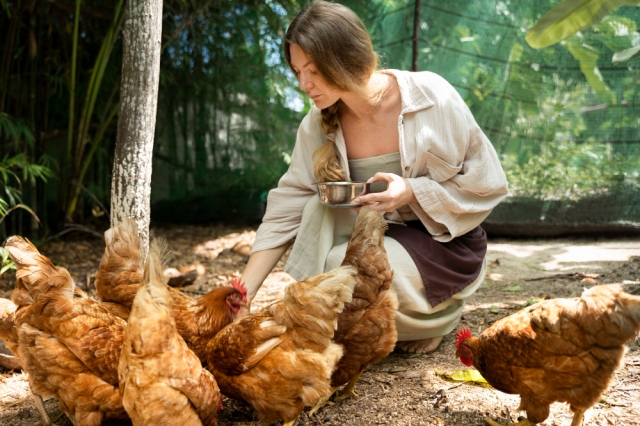Backyard chicken farming is all the rage—and for good reason. Besides the fresh eggs and that old-fashioned homestead vibe, it's a manageable project for anyone willing to get their hands a little dirty—just a little. Modern homesteading doesn't mean you've got to reinvent the wheel; it means working smarter, not harder. With the proper setup, some good tools, and a few nifty tricks, you can have a low-maintenance flock that's as close to self-sufficient as possible.
Here's how to make chicken farming as hands-free as possible.
Low-Maintenance Chicken Habitat Design
First things first, you need the right setup. Planning and constructing (or selecting) the right chicken habitat is essential to minimizing your daily tasks. Whether you're an advanced homesteader or just starting out a well-planned space will save you hours in the future.
With that in mind, start with the basics: chickens are pretty flexible, but they do best when a coop has a few critical elements, like protection from weather extremes, good ventilation, and safe sleeping quarters at night. Place the coop in an area with natural shade to keep it cool during the summer. Add some ventilation openings to improve airflow, which reduces smells and prevents moisture buildup that leads to mold.
Want it even simpler? Visualize a coop built with flexibility in mind. A moveable coop, or portable version, is ideal for a backyard flock. You can move the coop around your yard, evenly distributing any wear to your lawn while giving the chickens new ground to peck at.
Choosing the Right Coop for Flexibility and Ease
If you're trying to find the easiest way to manage your chickens, the right coop is everything. You don't need a sprawling setup if you're only keeping a few hens, and if you can pick a flexible design, you'll cut down on maintenance even further.
Ever heard of a portable rolling chicken coop? These functional coops are designed to move with ease, allowing you to roll them around your yard to different areas. This setup is ideal for maintaining grass health while giving your chickens access to fresh spots to forage. If you've ever worried about odors or worn patches of grass, a rolling coop can help by spreading out these impacts.
You don't need a large investment here, but the coop should be large enough for your chickens to roost comfortably and have secure latches to keep predators out. Chickens are fairly low-maintenance animals, but a well-chosen coop can save you a great amount of time and hassle.
Feeding and Hydrating with Less Fuss
Feeding chickens—how tough is that, right? Just toss some feed and water out there, and you're done. But if you want to cut down on daily chores, there are a few ways to streamline feeding, too. Chickens are creatures of habit and are perfectly happy with consistency.
Consider installing an automatic feeder. This simple addition will keep a steady supply of food available for days. You fill it once and let the feeder do the rest—no need to worry about daily feedings. The same goes for water. An automatic waterer ensures they stay hydrated, even on days when you're not around. For added convenience, go for a nipple waterer, which prevents spills and keeps the water cleaner for longer.
If you want to take it to the next level, try raising a small patch of chicken-friendly plants like clover or dandelions. These are easy to grow, and chickens love pecking through fresh greens. It's not only sustainable but also cuts down on feed costs over time.
Quick and Easy Seasonal Care
You won't need to change your setup completely with every change of weather. A few minor adjustments will keep your chickens comfortable throughout the year. In winter, add an extra straw or a thermal blanket inside the coop. In summer, ventilation is key—or even a small fan if it gets particularly hot where you live.
Keeping a Clean Coop Without the Hassle
Speaking of cleaning—this doesn't have to be a huge chore either. Chickens don't mind a little dirt, and their coop doesn't need to be spotless. But keeping up with a weekly routine helps maintain hygiene and cuts down on bad smells.
Every few days, do a quick once-over to clear out any droppings and replace soiled bedding. If you set aside a specific day each week for a more thorough cleaning, you'll find it only takes about 15–20 minutes to get everything fresh. Grab a dustpan or shovel to clear out bedding and a handheld brush to sweep away loose feathers and dust. A few spritzes of water with a drop of vinegar also help disinfect surfaces naturally.
And if you opted for a rolling coop, even better. Just wheel it onto a new patch of grass, and voilà—you've left droppings behind, creating an instant lawn fertilization method.
Wrapping Up: Keep It Simple and Enjoy the Process
Chickens are arguably the easiest livestock to keep, especially if you embrace a few shortcuts that make day-to-day care practically effortless. With flexible coops, automatic feeders, and time-saving seasonal care, you can enjoy a happy, healthy flock with just a little forethought.
Whether you're after fresh eggs or an entertaining project that won't overwhelm you, modern chicken farming fits perfectly into a sustainable lifestyle. And with the right setup, it doesn't have to be hard work. You might even become the go-to friend or neighbor for advice on starting a mini-flock. Once you get the hang of it, chicken farming doesn't feel like work—it's just part of a simple, rewarding homestead life.






